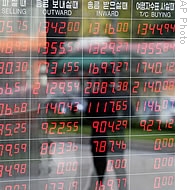voa标准英语2008年-Global Markets Respond Favorably to China Stimu(在线收听)
 |
| A South Korean man is reflected on an electronic screen displaying foreign exchange rates at the head office of Korea Exchange Bank, Seoul, South Korea, 10 Nov 2008 |
China says it will spend $586 billion to stimulate its economy, which is slowing along with major economies around the world. The plan focuses on boosting infrastructure, promoting business investment and consumer spending, maintaining export growth, and reforming the country's financial sector.
U.S. Treasury Undersecretary David McCormick hailed the plan after returning from a weekend meeting of G-20 finance ministers in Brazil.
"I think it is likely to have a very positive impact," said David McCormick. "China is an enormous country. There are huge challenges in terms of domestic consumption, and this stimulus should help encourage domestic consumption. And there is an infrastructure component of this, and of course China has enormous infrastructure needs. So we view this as a positive step.
McCormick was speaking on Bloomberg television.
As a percentage of its economic output, China's stimulus package outpaces similar measures enacted in the United States. So far this year, the U.S. government has spent $150 billion to prop up its faltering economy, and set aside $700 billion more to rescue troubled financial institutions. China's GDP is slightly more than half that of the United States.
Could China's stimulus provide a boost to the broader global economy? Not directly, according to University of Maryland business professor Peter Morici.
"It will not do the United States a lot of good, because China will still be very oriented towards exporting to the United States and not importing very much, which is a big drain on demand for U.S. good and services," said Peter Morici.
World markets reacted favorably to the news from Beijing. Shares in Tokyo rose nearly six percent, while European markets closed moderately higher. In New York, Wall Street's Dow Jones Industrial Average began the day with triple digit gains, but fluctuated between between positive and negative territory during the day.
Much of the global financial turmoil of recent months can be traced to America's home mortgage crisis, which caused many of the country's best-known financial and insurance firms to fail. Monday, the Bush administration announced that the biggest insurance company in the United States, American International Group, will receive additional assistance under the government's emergency rescue package after posting massive financial losses.
Meanwhile, America's second-largest electronics retailer, Circuit City, filed for bankruptcy - the latest sign of a severe economic downturn.